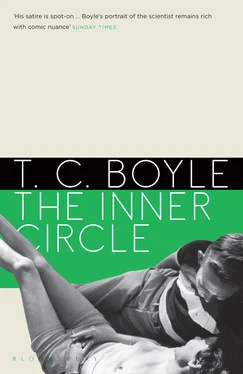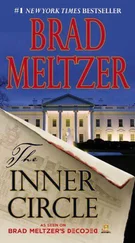T. Boyle - The Inner Circle
Здесь есть возможность читать онлайн «T. Boyle - The Inner Circle» весь текст электронной книги совершенно бесплатно (целиком полную версию без сокращений). В некоторых случаях можно слушать аудио, скачать через торрент в формате fb2 и присутствует краткое содержание. Год выпуска: 2006, Издательство: Bloomsbury UK, Жанр: Современная проза, на английском языке. Описание произведения, (предисловие) а так же отзывы посетителей доступны на портале библиотеки ЛибКат.
- Название:The Inner Circle
- Автор:
- Издательство:Bloomsbury UK
- Жанр:
- Год:2006
- ISBN:нет данных
- Рейтинг книги:4 / 5. Голосов: 1
-
Избранное:Добавить в избранное
- Отзывы:
-
Ваша оценка:
- 80
- 1
- 2
- 3
- 4
- 5
The Inner Circle: краткое содержание, описание и аннотация
Предлагаем к чтению аннотацию, описание, краткое содержание или предисловие (зависит от того, что написал сам автор книги «The Inner Circle»). Если вы не нашли необходимую информацию о книге — напишите в комментариях, мы постараемся отыскать её.
The Inner Circle — читать онлайн бесплатно полную книгу (весь текст) целиком
Ниже представлен текст книги, разбитый по страницам. Система сохранения места последней прочитанной страницы, позволяет с удобством читать онлайн бесплатно книгу «The Inner Circle», без необходимости каждый раз заново искать на чём Вы остановились. Поставьте закладку, и сможете в любой момент перейти на страницу, на которой закончили чтение.
Интервал:
Закладка:
But now — tonight, on my big night, the night before the graduation ceremony and all the uncertainty it implied — she took hold of me and pressed her body to mine so that I could feel her breasts go soft against my chest. Her voice was so low it was barely audible. “Kiss me,” she whispered.
The ceremony went off as planned, the speeches sufficiently inspiring, the weather cooperating, President Wells exercising his handshake and handing over the diplomas one after another as a gentle breeze came down out of Illinois to animate our robes and tug ever so gently at the girls’ hairdos. Afterward, there was a private reception at Prok’s — he’d insisted, he wouldn’t take no for an answer, it was the least he could do for a young man who’d done so much for him — and we got to glory among the flowers and sample Mac’s punch and Prok’s liqueurs. My mother didn’t really hit it off with Mac, which wasn’t unusual for her — she’d always worn her reserve like a suit of armor and had never really warmed to people, not till she’d mixed with them four or five times, and even then there was no guarantee — but there was something deeper and more complex involved here, and I’d probably cite Freud at this juncture but for the fact that Prok so rigorously educated me against him.
Prok, though, was a different story — she seemed to take to him right away. Of course, he went out of his way to make my mother feel comfortable, zeroing right in on her and giving her an extended tour of the garden, all the while soliciting her opinion on the dahlias or the heliotropes — or the azaleas that just seemed to thrive in the most acidic conditions he could provide, and had she tried coffee grounds? Coffee grounds were one of the most convenient and effective ways of changing the pH factor of the soil, at least as far as Prok had been able to discover. Of course you had to be mindful of chlorosis, but that could be cured by the addition of iron chelate to the soil, well worked in, needless to say …
I watched them draw slowly away from the main body of the party, my mother balancing a tiny liqueur glass in one gloved hand, the sun glancing off the crown of her hat and making a glowing transparency of the single long trailing feather, Prok nodding and gesticulating as he guided her down the path. He was dressed formally, in what we (that is, Corcoran, Rutledge and I) came to regard as his uniform: dark suit, white shirt, crisply knotted bow tie in a two-color geometric pattern. I could see that he was a bit on edge because of having to give up a day’s work, first for the academic convocation at the graduation ceremony and now for this little gathering, but to the uneducated eye he seemed as relaxed and charming as an antebellum plantation owner showing off his holdings. The children were playing an extended game of croquet, while Iris, Tommy and I sat under a tree with my Aunt Marjorie and Mac, who’d kicked off her shoes and was forever dashing back and forth from the house with a tray of canapés or the persimmon tarts she’d baked herself that morning in my honor.
We were talking of everything but the war, because the war was happening someplace else, far across the sea, and this was our day — Tommy’s, Iris’s and mine — and there was no reason to let the darkness intrude. My aunt, never a loquacious woman, not unless she was gossiping with her sister-in-law, sat in a wicker chair with her ankles crossed and smiled a faraway smile, thinking perhaps of her husband, who’d been killed at Ipres in the first war. Mac, when she was with us, held forth charmingly on any number of subjects, including the Girl Scouts, knitting — Aunt Marjorie perked up a bit here — and, of course, sex research. It was all very relaxed.
At one point, just as the children ended their game with a shout of triumph from one of the girls, Iris pushed herself up off the lawn, patting down her dress as if she’d been lying there in the grass since it first sprouted. “Why don’t we play?” she said. “You, me and Tommy. Come on.”
If I hesitated (and I might have, lulled by her presence — and Mac’s — as well as the golden fluid issuing from the flask on command), she wouldn’t hear of it.
“Come on,” she repeated. “Are you afraid I’m going to beat you or something?” She was wearing a summer dress that left her arms bare, and she stretched, then brought her heels together and made a muscle with her right arm. “Because you ought to be. I’ll have you know I was croquet champion of the entire neighborhood.”
“When you were nine maybe,” Tommy said, but he was already getting up from the grass himself.
We played a languid game out on the lawn, the sun holding steady overhead, Iris chasing down our balls and hammering them into the flowerbeds whenever she had the chance. There were gales of laughter. The flask circulated. I don’t think I’d ever been happier, but for one thing — the look Prok gave us when he emerged with my mother from the rear of the property. His face was stripped naked for just a moment, his mouth screwed up in a kind of pout of disdain, and I wondered what sin we were committing, what transgression, until it came to me: Prok hated games of any sort. Games were nonproductive. Games were, by definition, a waste of time — a pastime, that is, which was the same thing. Only work had any validity for him, and he never understood when we (again, Corcoran, Rutledge and I) spent even a moment’s time engaged in any activity that didn’t directly serve the project. We might have spent twelve hours in a single day taking sex histories and then come back to the hotel to relax with the radio and a game of cards, and Prok would insist that we should be reading and studying the literature so as to better perform our function and advance the research.
There was one time — and I’m jumping ahead here eight or ten years — when Prok, Corcoran and I had been on a research trip to take histories in Florida. We’d driven down from Indiana so Prok could address a group of college administrators who were holding a series of seminars in Miami, and we’d put in five intense days of recording histories from the moment we’d finished breakfast right on through to ten and eleven at night. On the final day, the day before we were to drive back to Indiana and the perennial ice of winter, we finished up by eight in the evening, and on a lark Corcoran and I pulled in at a miniature golf course. Corcoran — he was the ultimate extrovert, sunny, glad-handing, an obsessive serial sexual adventurer — was at the wheel because Prok was busy beside him with a flashlight and the sheaf of interviews we’d just concluded. “Say,” he cried out suddenly, “John — do you see that, up ahead there on the left?”
I was in back. I leaned forward over the seat and saw what he was talking about — a glittering playland of lights leaching out into the Florida night, and a sign superimposed above them: TEETER’S MINIATURE GOLF.
“Time for a little rest and relaxation?” he asked, already swinging the wheel wide as Prok glanced up distractedly from the papers in his lap.
There was an anti-authoritarian streak in Corcoran, a boyish playfulness Prok tolerated in a way he wouldn’t have in anybody else, and I wakened to it in that moment. Why not? I thought. Why not get out from under the whip, if only for an hour? “Sure, yes,” I said, “that would be — that would hit the spot. And I’ve never, and we are going back tomorrow …”
And before Prok could protest, it was a fait accompli, the car pulled up snug to the admission booth in the gravel lot, Corcoran and I paying for our tickets and selecting our clubs while the palms rustled in a breeze that was as warm as the breath of the furnace back at home. We must have played for two hours or more, feeling lighthearted and a bit silly, feeling like boys who despite the frivolity of the situation had always been in competition with one another and fought to win no matter how inconsequential the victory might have been. (As I recall, for the record, I wound up beating him that night, if only just narrowly.) But Prok. Prok tried to be good-natured about it, yet he was beside himself. He couldn’t understand it. Couldn’t imagine why grown men would behave like adolescents, why they would dissipate precious time that could be devoted to the project, to work, to the accretion of knowledge and the advancement of culture, and all in the name of a vapid amusement. He paced. He hectored us from behind the fence. “Corcoran,” he called, and his voice was a sorry bleat of remonstrance. “Corcoran. Milk. You’re holding up the project!”
Читать дальшеИнтервал:
Закладка:
Похожие книги на «The Inner Circle»
Представляем Вашему вниманию похожие книги на «The Inner Circle» списком для выбора. Мы отобрали схожую по названию и смыслу литературу в надежде предоставить читателям больше вариантов отыскать новые, интересные, ещё непрочитанные произведения.
Обсуждение, отзывы о книге «The Inner Circle» и просто собственные мнения читателей. Оставьте ваши комментарии, напишите, что Вы думаете о произведении, его смысле или главных героях. Укажите что конкретно понравилось, а что нет, и почему Вы так считаете.












